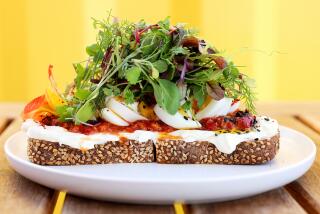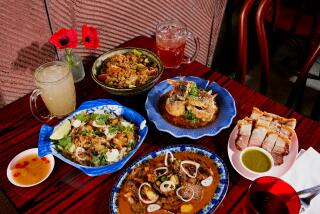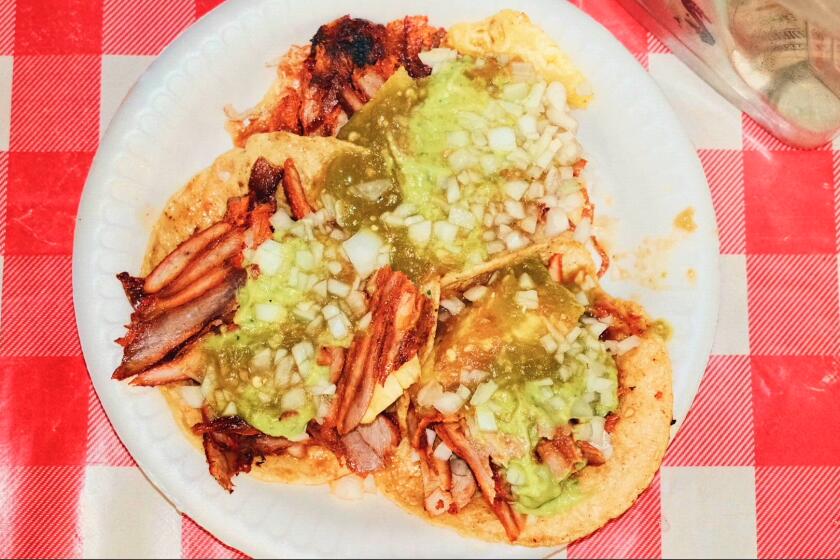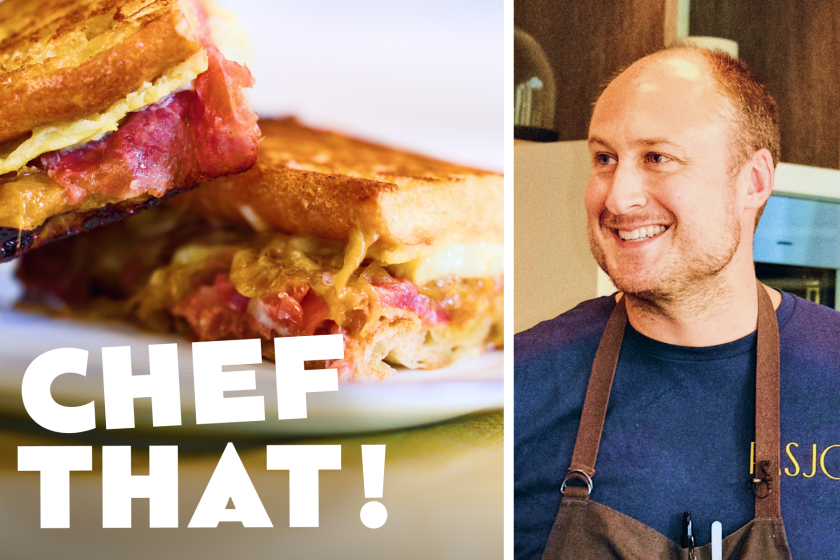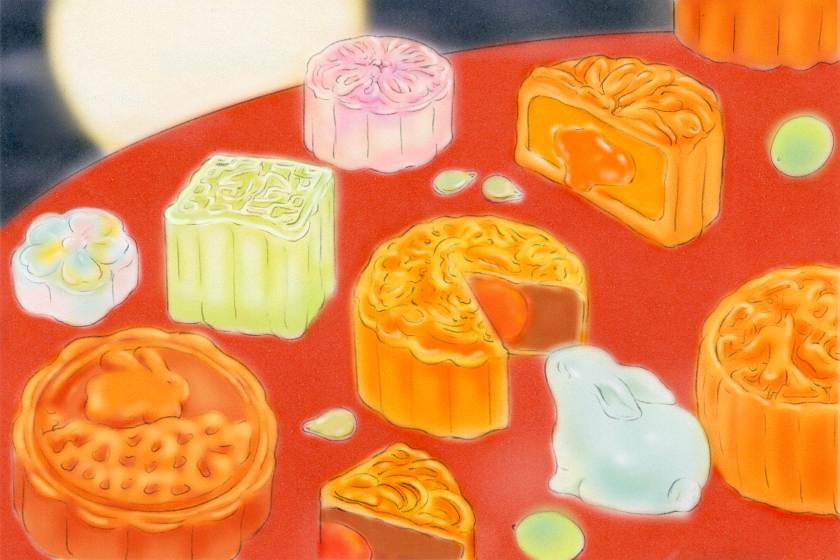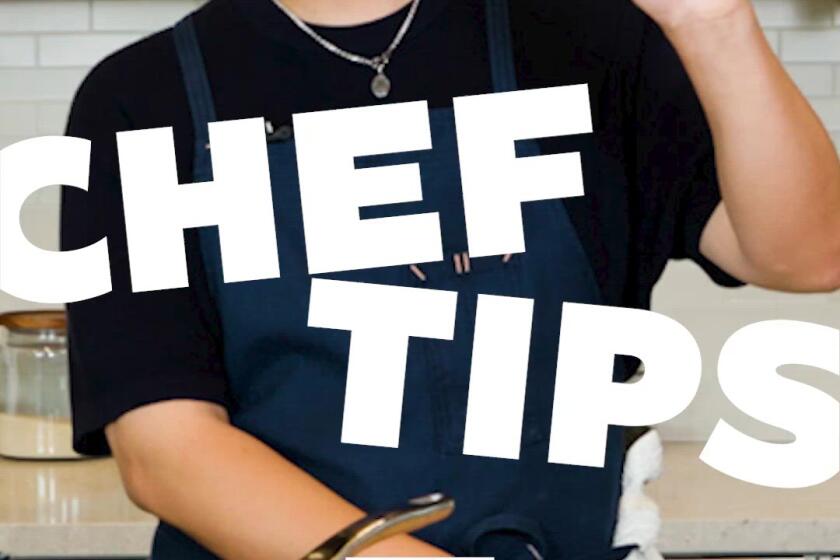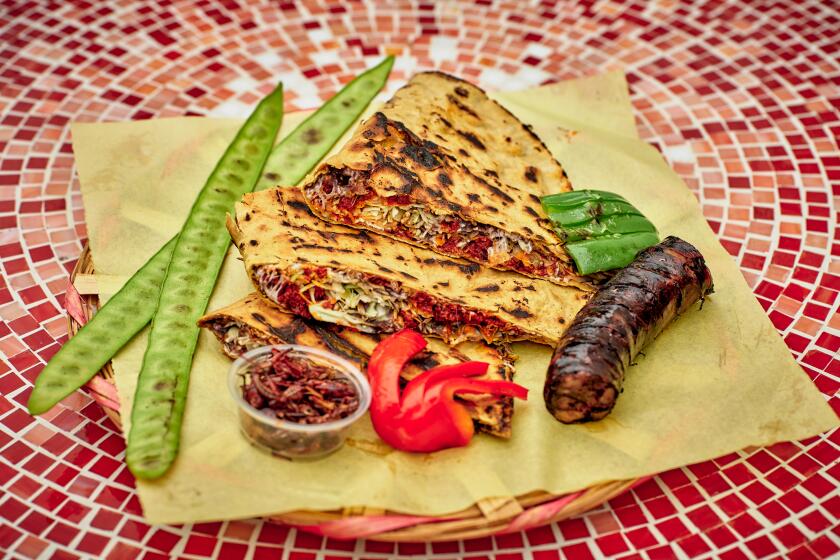Wine guru Lou Amdur on kosher wine and what to eat and drink for Hanukkah
L.A.’s wine guru Lou Amdur, no longer Sqirl-adjacent and now operating his Lou’s Wine Shop and Tastings in Los Feliz, has thoughts about wine and Hanukkah, which begins Tuesday evening. None of the wines, however, were made according to Jewish dietary law.
It’s not that Amdur doesn’t have opinions about kosher wines. He does: “The problem with meshuval wines is that they have to be boiled, so as to render them unfit for pagan uses” is how he started in on the subject when we recently caught up with him. Amdur actually had quite a lot to say about wine, crispy latkes and why, for him, industrial ciders bring on melancholia.
Hanukkah meals come with their own set of challenges. First off, because the holiday lasts for eight days, one conceivably might be planning a week and a day’s worth of special dinners.
The Festival of Lights is actually a Festival of Fat.
Yes! To remind us of the story of the menorah and the oil that miraculously burned for eight days, we eat oily food.
Doughnuts are as traditional as potato latkes, perhaps more so, given that the potato came from the New World. One thing I do not understand about Jewish conspiracy theories: If the Jews are supposedly puppet masters of the world, why is our food so bad? At least, Ashkenazic food? You’d think we’d be loading up our latkes with caviar. Instead, sour cream and applesauce.
How can you use the word “bad” when talking about fried food?
I’ve had many, possibly thousands, of overly oily latkes. A proper potato latke has to be thin and crisp.
What wine goes well with a thin, crisp potato latke?
Latkes are earthy, and you have sweet applesauce, and then the lactic tang of sour cream. If you can find it, try an Albana di Romagna. This is a wine from the Italian center of fatty food, Emilia-Romagna. It’s earthy, not acid-driven. I think acidity is not called for with latkes, but you want some, otherwise it wouldn’t be refreshing.
Describe the taste.
Nuts and apples -- but try to find a dry version, as it’s often made in a sweet, passito style.
If you can’t find an Albana di Romagna, what’s an available alternative?
“Feinherb” German Riesling. This is a style of Riesling that’s just a little sweet. Hexamer from the Nahe region makes a great Feinherb. The 2013 is a stunning vintage.
What goes with a Portuguese-style latke, which call not for potatoes, but for ricotta cheese?
There’s some lactic acid, so I’d suggest a white wine that goes through malolactic fermentation. This is a natural process in which lactic bacteria eat some or all of the naturally occurring malic acid in wine, and convert it to lactic acid. Some white wine is sulfured, following fermentation, to keep this from happening. I’d suggest a dry Hungarian Furmint. Or a Portuguese wine made from the grape Antao Vaz. Bott makes an astonishing dry Furmint. For Portuguese, the 100% Antao Vaz from Herdade do Rocim is superb. Another great option would be an off-dry Chenin Blanc from the Loire valley.
What about the theory that the best accompaniment to a hot, crispy latke is beer or hard cider?
Basque [cider] is going to be sour and salty, which I love, but not with potato pancakes and applesauce. Normandy cider will be less austere, but WARNING: may be funky. So, if funk is not your thing, ask your merchant before you purchase. There’s plenty of industrial cider on the market, and I suggest avoiding those completely.
What industrial cider should we steer clear of?
So many ... most. [long pause] I don’t want to talk about it. [long pause] It makes me sad.
Sad? What made you sad?
A noble, ye olde American beverage rendered into garbage. They have no life force, no energy. Good, farmstead cider makes you happy to be on this planet. Plus, there’s this archaic dimension that, for me, tastes medieval. I really dig Eaglemount quince cider, but also Troy cider.
Moving on to wine that goes well with the many traditional Hanukkah entrees. A main course can be pot roast or short ribs. It can be brisket or roast chicken.
For a simple roast chicken, I love good Beaujolais. It’s a boring, broken record for me, but in general, if you speak with me regarding wine for more than a few minutes, Beaujolais is sure to come up. No Beaujolais Nouveau -- it’s mostly garbage, and for the handful of growers that do a good job, pony up two more dollars and get something really good. Look for Jean-Paul Brun’s basic Beaujolais (it’s about $18).
I’m hardly saying anything startling regarding chicken and good Beaujolais. This is wisdom enshrined in decades, if not centuries, of standard bistro fare.
And main courses that involve meat oven-cooked very slowly?
I like a good, lighter-styled zinfandel -- Mike Dashe’s Enfant Terrible, for example.
Let’s hear about your perfect three-course Hanukkah meal, the one you dream about, and what you’d pour with each course.
First course, latkes. Again, I love thin, crisp latkes -- caramelize some onions, and add them to your homemade applesauce. You have a food mill but rarely use it? Now’s the time. Also sweet potato latkes.
And parsnip latkes. I got that idea from Union Square Cafe in New York. Parsnips, like carrots, are naturally sweet, and frying them in oil caramelizes some of the sugar, emphasizing their natural sweetness. With any style of latke, I think applesauce is called for, so I’d go with a wine that’s fruity, a little sweet, and with inherent apple-y flavors, but you have to also have sufficient acid to make it a refreshing beverage.
The clear choice here is a traditional, fruity-style Riesling -- I’m really impressed with the work that John House is doing in Oregon with aromatic grape varieties, and suggest trying his “Off the Grid” Riesling. Another option, one in which the residual sugar approaches zero, would be a wine from Germany’s Pfalz region. The Weissburgunder from Koehler-Ruprecht -- maybe tastes a little parsnip-y right out of the bottle.
What comes after the latkes?
Braised lamb shanks. Why? Because they’re easy to make, hard to mess up, and are very satisfying.
Trim off some of the fat, salt and pepper, overnight in the fridge. Then sear all over in a Dutch oven, toss in some aromatics, some red wine, and then put in a moderate oven.
Cook until gedempte …
Translation: Soft, tender.
… Defat the sauce, run it through the food mill, adjust seasonings.
And the wine that you drink with the gedempte braised lamb?
I used to really dig Cotes du Rhone, but the wines have become over the top -- 5% a.b.v. [alcohol by volume] is no longer an outlier vintage. From our shores, Mike Cruse’s Valdiguie -- so good! Super juicy, bright. If you do not have access to a good neighborhood wine shop, you can pick up a bottle of J. Lohr’s Valdiguie at your local Albertsons for maybe $12 or so. Also, Mike Roth’s wines -- his Cabernet Franc.
If you do not have a good neighborhood wine shop, consider moving.
Dessert time!
With dessert, I am adamantly opposed to “dessert” wine. Unless you’re serving a fairly non-sweet dessert, I just don’t comprehend the gastronomic wisdom of serving a sweet wine with sweets. Are you so sugar-deprived the rest of the year that you have to decompensate by adding more sugar to your dessert?
Sweet wine is for after dessert, for those who are not yet in a food coma. Or, in lieu of dessert, to be enjoyed with some salty, stinky cheese. So I say drink Madeira. Not a Malmsey or a sweeter-style Madeira, but a Sercial, which is drier. Like a Charleston Sercial, Rare Wine Co. Historic Series.
Say it’s the first night of Hanukkah. Should we break out a bottle of something that’s celebratory?
Yes! The first night, have something sparkling, because, hell, it is a celebration. A Prosecco Col Fondo, which is old-school, bottle-conditioned, pre-industrial Prosecco, with the yeast still in the bottle. Zanotto is one good one, but Casa Coste Piane is also great.
And on the last night of Hanukkah? What’s a good closer?
I’d suggest something really atavistic, old-school, skin-contact white wine, a.k.a. orange wine. Kabaj would be great, but what I’d love for people to try is a skin-contact Verduzzo from Friuli. I’m partial to anything Denis Montanar makes. Actually, a skin-contact Verduzzo would be great for all eight days.
It was the wine served at my bris, and it’s the wine I want served when you’re sitting shiva for me.
Lou’s Wine Shop & Tastings: 1911 Hillhurst Ave., Los Feliz, (323) 305-7004, louwineshop.com.
More to Read
Eat your way across L.A.
Get our weekly Tasting Notes newsletter for reviews, news and more.
You may occasionally receive promotional content from the Los Angeles Times.

